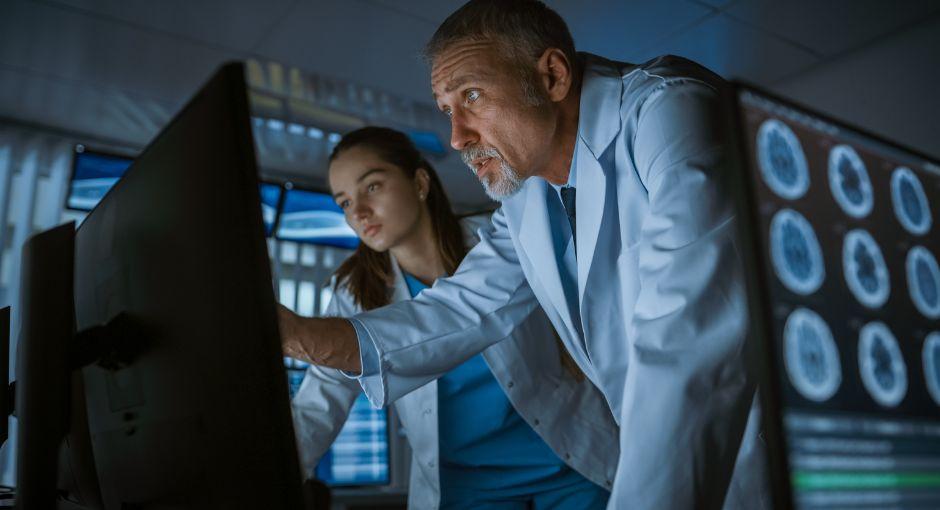8 Questions You’ve Always Wanted to Ask About Deep Brain Stimulation Surgery

Deep brain stimulation (DBS) is a surgical therapy used to treat certain aspects of Parkinson’s disease (PD). Mel Mitchell, age 74, was diagnosed with Parkinson’s disease in 2013. Mel underwent DBS surgery in 2020 with the goal of improving his PD symptoms. We asked the most frequently asked questions for someone who has undergone this brain surgery.
Why did you decide to undergo DBS surgery?
I was diagnosed with Parkinson’s nine years ago. I had been taking the medication Sinemet since my diagnosis, but Parkinson’s medications only have so much impact when it comes to improving motor symptoms. About two and a half years ago, it seemed that DBS would be the next logical step in my Parkinson’s journey. When I spoke with my neurologist and a neurosurgeon, they agreed I would be the perfect candidate for DBS.
Did you have any fears going into surgery?

My biggest fear was that the surgery wouldn’t work. There is a lot of preparation that goes along with getting ready for DBS surgery, so I didn’t want it to be for nothing. I also have a blood clotting disease which creates a bigger chance of blood clots, so I need to manage that whenever I go into surgery.
One thing that helped ease my fears was meeting with a representative from the company I used for my DBS instrument. She talked to me and my wife about DBS and she attended my surgery and my fine tune sessions. She was extremely helpful in sharing real life examples and answering our questions.
What was it like getting brain surgery?
Surgery was strange for several reasons. When you get fitted for DBS, they put a metal collar on you to make sure your head doesn’t move while they are drilling and inserting the leads, which are implanted to control brain activity. I'm claustrophobic, so even though it wasn't painful, it felt odd for my head to be in such a restrictive collar. I was awake for the entire surgery so that the neurosurgeon could ask me questions as he placed the leads.
Two weeks after the first surgery, I had a second surgery to place the battery and connect the leads. This was done under general anesthesia and I went home the same day. The DBS device wasn’t “turned on” for another 4 weeks.
Did DBS work for you?
I would say that except for my memory, my symptoms are better since DBS. My walking and gait were very much improved for the first couple of months. After my surgery, I wrote my friends a note that said, “This is a miracle.” It wasn't a miracle for very long, but it felt so good that my symptoms had improved after the surgery.
Stiffness was also an issue for me, which DBS has helped improve. For someone with Parkinson’s, I never had much of a tremor, but tremor is usually the symptom most well-taken care of by DBS.
My neurologist has continued to adjust my device. In fact, this month we made an adjustment to my right side that has significantly improved my walking. We will continue to adjust the device as my symptoms progress.
What was the most unexpected result of DBS surgery?
I wasn’t expecting to experience memory problems after DBS surgery. My short-term memory is where I have the most trouble. You can say something to me and if you ask me about it tomorrow, I'll say, “Did we talk about that?”
These memory problems have been especially hard on my relationship with my wife. We’re going to see a counselor to discuss this issue. I don't think everyone who has DBS surgery experiences problems with memory, but people should be aware that it might happen.
How did your support network help you throughout this process?
Prior to the surgery, we took some classes through the Parkinson’s Foundation to learn more about DBS. My wife is my care partner, and she helped keep me grounded. I have a tendency to say things are fine when they're not, so she was quick to point out what we needed.
For other support, I wish my surgeon would’ve talked with me more about the results. We had a post-operation discussion, which didn't last long because things were going so well at that time. I haven't talked to him since that initial post-operation appointment.
What do you wish you knew before getting DBS?
I wish I had a better understanding of how DBS surgery would impact my care partner. The surgery directly affects your care partner because they have to adapt to what you, as someone with Parkinson’s, can do during or after the surgery. It’s been hard for my wife because she has to manage things in our life that she never used to have to manage. If people are going to get DBS, they need to include their care partners in this decision.
Do you have any advice for someone who is considering DBS?
DBS is a powerful tool, but much like the Parkinson’s medications most of us take, the surgery only has so much impact. It’s important to manage your expectations. Be as real and honest about the situation as you can be. If you have a solid understanding of what's happening, you won’t be expecting results that are out of reach for you.
Watch our Surgical Options Neuro Talk to learn more about deep brain stimulation and talk to your neurologist to find out if you may be a candidate for DBS surgery.
Related Blog Posts

Resting Tremor and DBS. Sooner Better Than Later?

Neuro Talk: Surgical Options
